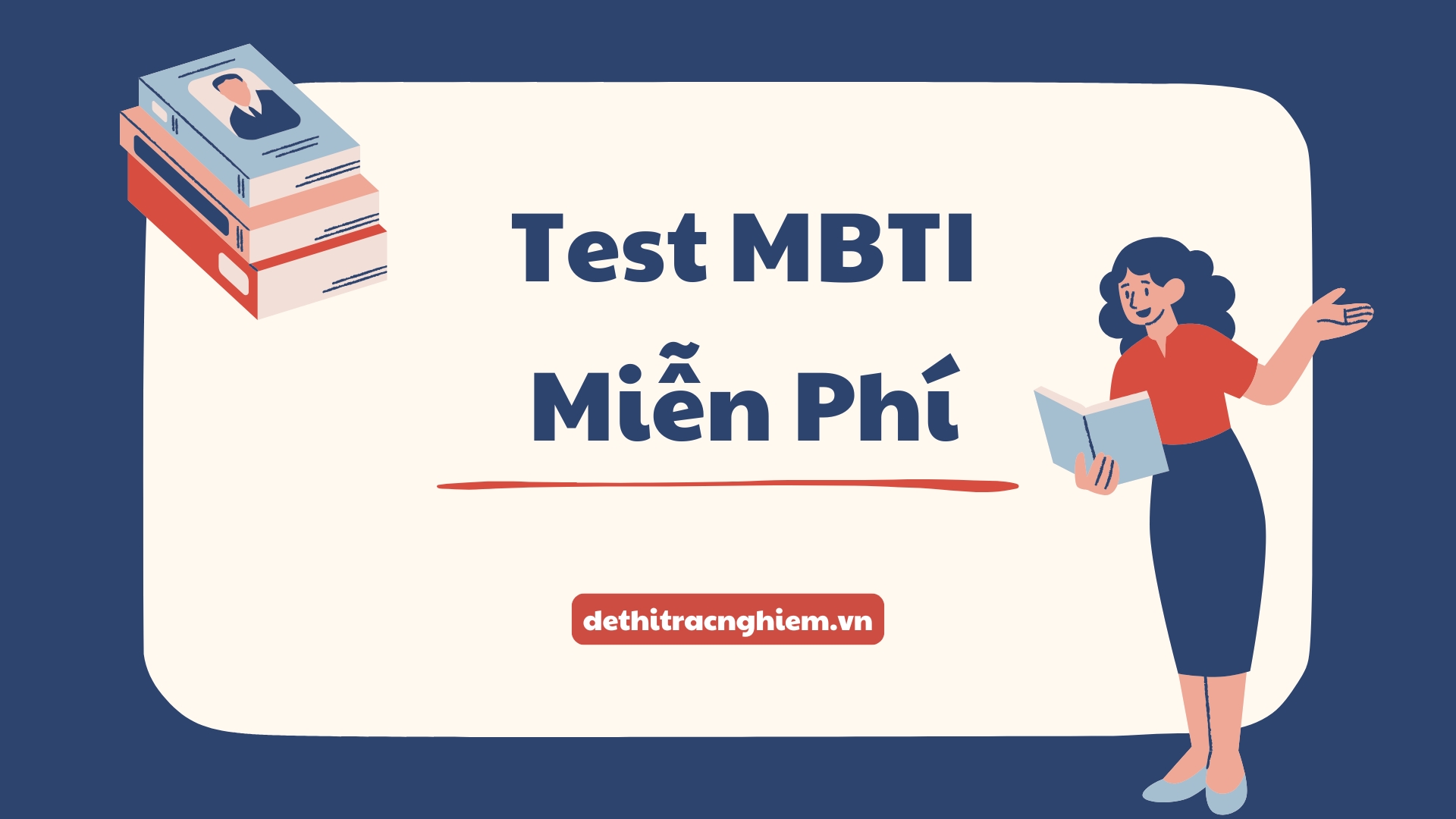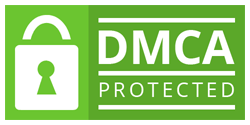Đề thi thử Đại học 2025 môn Tiếng Anh – THPT Ba Đình – Thanh Hóa là một trong những đề tiêu biểu thuộc Tổng hợp đề thi thử môn Tiếng Anh THPT QG, nằm trong chương trình Đề thi vào Đại học. Đây là đề thi thử được trường THPT Ba Đình (Thanh Hóa) tổ chức nhằm giúp học sinh lớp 12 ôn tập kiến thức, làm quen với cấu trúc đề thi chuẩn của Bộ GD&ĐT và nâng cao khả năng làm bài trong kỳ thi tốt nghiệp THPT năm 2025.
Đề thi có cấu trúc hợp lý, bám sát đề minh họa 2025, bao gồm các phần quen thuộc như: phát âm – trọng âm, từ vựng – ngữ pháp, chức năng giao tiếp, tìm lỗi sai, đọc điền, đọc hiểu và viết lại câu. Các trọng tâm kiến thức chủ yếu xoay quanh chương trình lớp 12 như thì của động từ, câu điều kiện, mệnh đề quan hệ, cấu trúc so sánh, đảo ngữ, collocations và idioms. Đề thi có sự phân hóa rõ ràng, phù hợp cho học sinh ở nhiều mức độ, từ trung bình đến khá – giỏi, giúp các em định hướng ôn luyện hiệu quả hơn.
Hãy cùng Dethitracnghiem.vn tìm hiểu về đề thi này và tham gia làm kiểm tra ngay lập tức!
- Số trang: 4 trang
- Hình thức: Trắc nghiệm
- Thời gian làm bài: 50 phút (không kể thời gian phát đề)
ĐỀ THI THỬ ĐẠI HỌC MÔN TIẾNG ANH NĂM 2025 THPT BA ĐÌNH – THANH HÓA
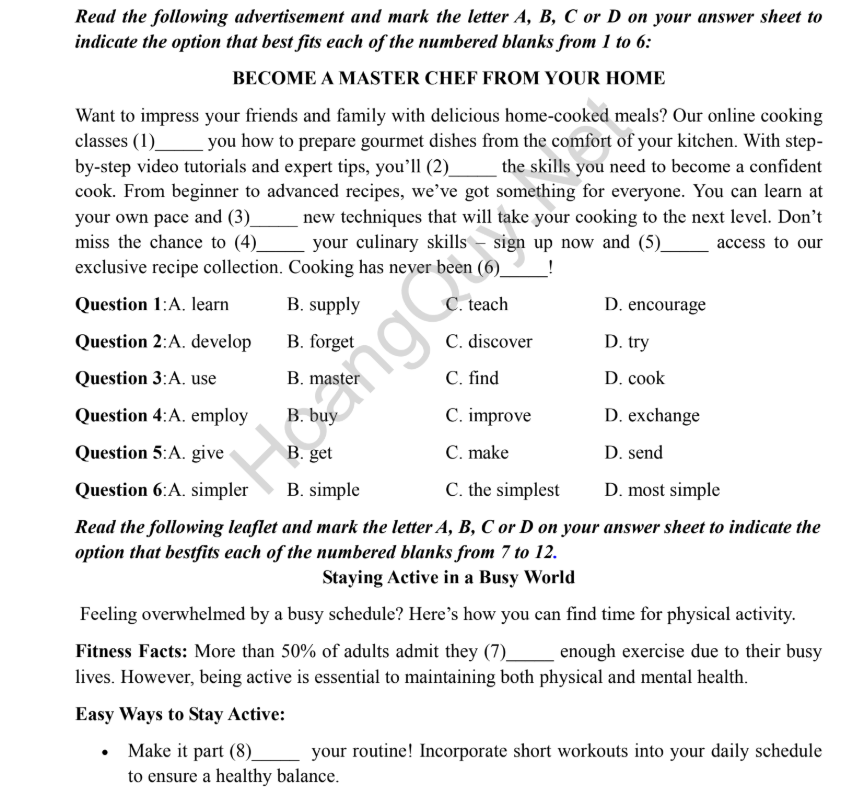
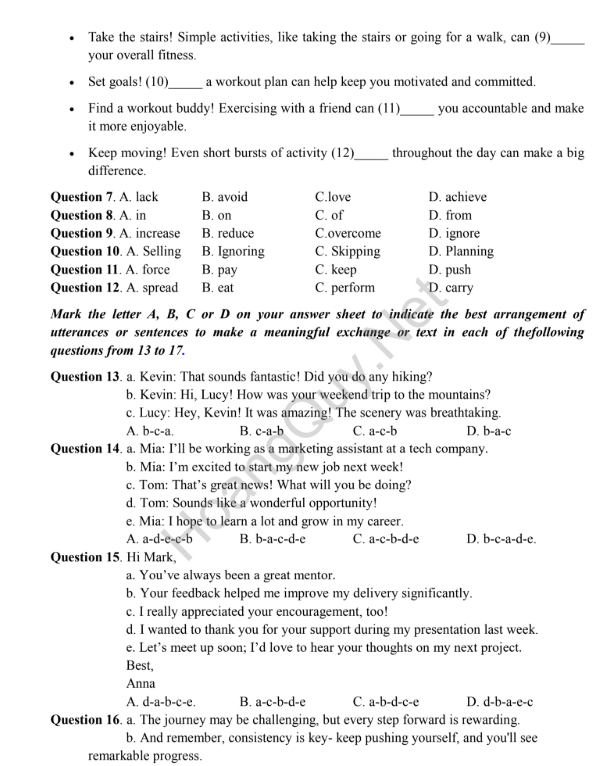
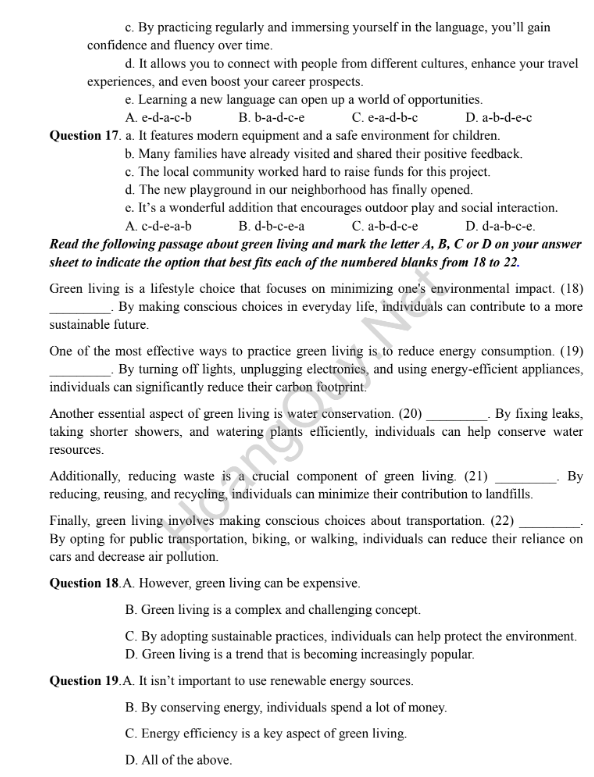
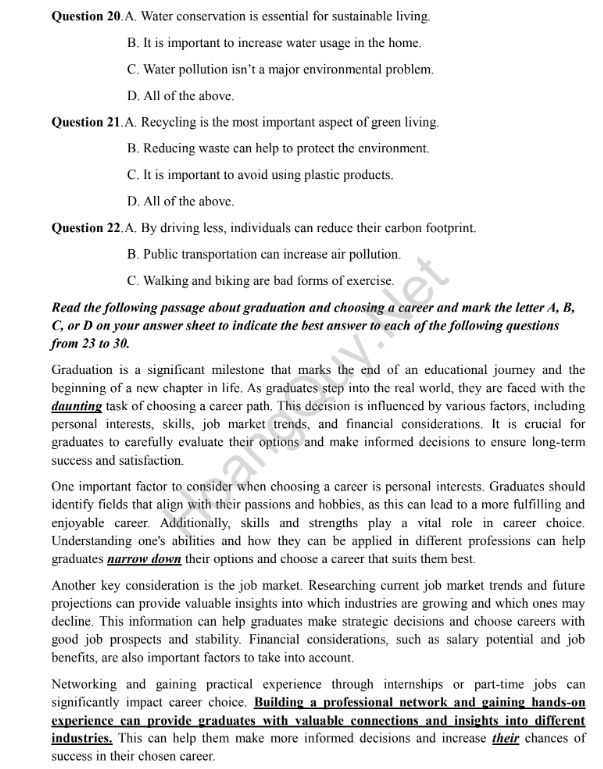
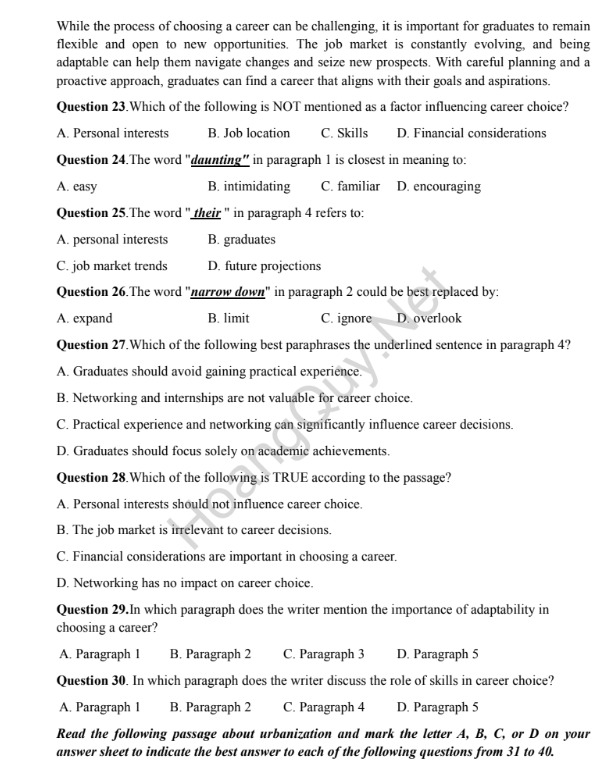
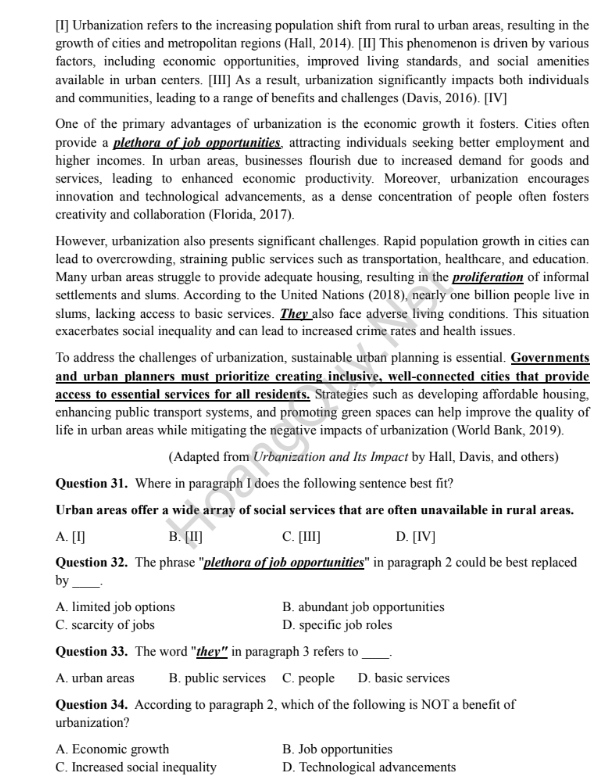
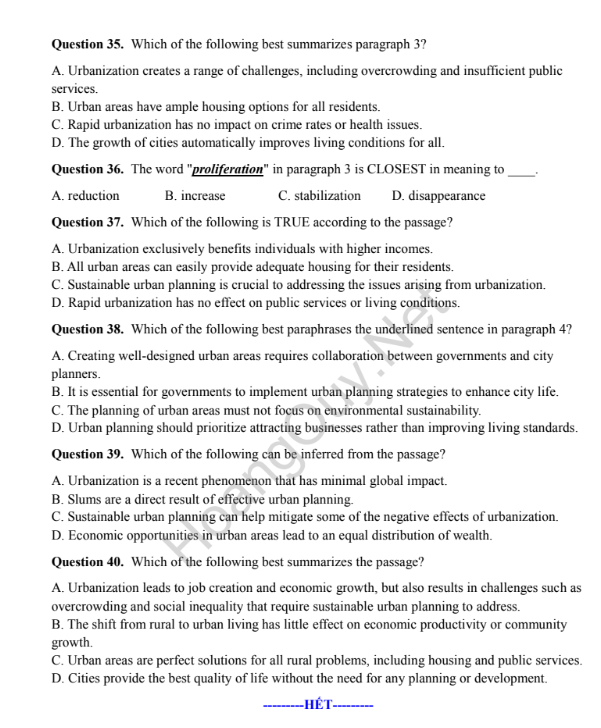
Read the following advertisement and mark the letter A, B, C or D on your answer sheet to indicate the option that best fits each of the numbered blanks from 1 to 6:
BECOME A MASTER CHEF FROM YOUR HOME
Want to impress your friends and family with delicious home-cooked meals? Our online cooking classes (1) ______ you how to prepare gourmet dishes from the comfort of your kitchen. With step-by-step video tutorials and expert tips, you’ll (2) ______ the skills you need to become a confident cook. From beginner to advanced recipes, we’ve got something for everyone. You can learn at your own pace and (3) ______ new techniques that will take your cooking to the next level. Don’t miss the chance to (4) ______ your culinary skills – sign up now and (5) ______ access to our exclusive recipe collection. Cooking has never been (6) ______!
Question 1:
A. learn
B. supply
C. teach
D. encourage
Question 2:
A. develop
B. forget
C. discover
D. try
Question 3:
A. use
B. master
C. find
D. cook
Question 4:
A. employ
B. buy
C. improve
D. exchange
Question 5:
A. give
B. get
C. make
D. send
Question 6:
A. simpler
B. simple
C. the simplest
D. most simple
Read the following leaflet and mark the letter A, B, C or D on your answer sheet to indicate the option that bestfits each of the numbered blanks from 7 to 12.
Staying Active in a Busy World
Feeling overwhelmed by a busy schedule? Here’s how you can find time for physical activity.
Fitness Facts: More than 50% of adults admit they (7) ______ enough exercise due to their busy lives. However, being active is essential to maintaining both physical and mental health.
Easy Ways to Stay Active:
Make it part (8) ______ your routine! Incorporate short workouts into your daily schedule to ensure a healthy balance.
Take the stairs! Simple activities, like taking the stairs or going for a walk, can (9) ______ your overall fitness.
Set goals! (10) ______ a workout plan can help keep you motivated and committed.
Find a workout buddy! Exercising with a friend can (11) ______ you accountable and make it more enjoyable.
Keep moving! Even short bursts of activity (12) ______ throughout the day can make a big difference.
Question 7:
A. lack
B. avoid
C. love
D. achieve
Question 8:
A. in
B. on
C. of
D. from
Question 9:
A. increase
B. reduce
C. overcome
D. ignore
Question 10:
A. Selling
B. Ignoring
C. Skipping
D. Planning
Question 11:
A. force
B. pay
C. keep
D. push
Question 12:
A. spread
B. eat
C. perform
D. carry
Mark the letter A, B, C or D on your answer sheet to indicate the best arrangement of utterances or sentences to make a meaningful exchange or text in each of thefollowing questions from 13 to 17.
Question 13:
a. Kevin: That sounds fantastic! Did you do any hiking?
b. Kevin: Hi, Lucy! How was your weekend trip to the mountains?
c. Lucy: Hey, Kevin! It was amazing! The scenery was breathtaking.
A. b-c-a.
B. b-c-a
C. c-a-b
D. b-a-c
Question 14:
a. Mia: I’ll be working as a marketing assistant at a tech company.
b. Mia: I’m excited to start my new job next week!
c. Tom: That’s great news! What will you be doing?
d. Tom: Sounds like a wonderful opportunity!
e. Mia: I hope to learn a lot and grow in my career!
A. a-d-e-c-b
B. b-c-a-d-e
C. a-c-b-d-e
D. b-c-a-d-c.
Question 15:
Hi Mark,
a. You’ve always been a great mentor.
b. Your feedback helped me improve my delivery significantly.
c. I really appreciated your encouragement, too!
d. I wanted to thank you for your support during my presentation last week.
e. Let’s meet up soon; I’d love to hear your thoughts on my next project.
Best,
Anna
A. d-a-b-c-e.
B. a-c-b-d-e
C. a-b-d-c-e
D. d-b-a-e-c
Question 16:
a. The journey may be challenging, but every step forward is rewarding.
b. And remember, consistency is key- keep pushing yourself, and you’ll see remarkable progress.
c. By practicing regularly and immersing yourself in the language, you’ll gain confidence and fluency over time.
d. It allows you to connect with people from different cultures, enhance your travel experiences, and even boost your career prospects.
e. Learning a new language can open up a world of opportunities.
A. e-d-a-c-b
B. b-a-d-c-e
C. e-a-d-b-c
D. a-b-d-e-c
Question 17:
a. It features modern equipment and a safe environment for children.
b. Many families have already visited and shared their positive feedback.
c. The local community worked hard to raise funds for this project.
d. The new playground in our neighborhood has finally opened.
e. It’s a wonderful addition that encourages outdoor play and social interaction.
A. c-d-e-a-b
B. d-b-c-e-a
C. a-d-b-c-e
D. d-a-b-c-e.
Read the following passage about green living and mark the letter A, B, C or D on your answer sheet to indicate the option that best fits each of the numbered blanks from 18 to 22.
Green living is a lifestyle choice that focuses on minimizing one’s environmental impact. (18) ______ By making conscious choices in everyday life, individuals can contribute to a more sustainable future.
One of the most effective ways to practice green living is to reduce energy consumption. (19) ______ By turning off lights, unplugging electronics, and using energy-efficient appliances, individuals can significantly reduce their carbon footprint.
Another essential aspect of green living is water conservation. (20) ______ By fixing leaks, taking shorter showers, and watering plants efficiently, individuals can help conserve water resources.
Additionally, reducing waste is a crucial component of green living. (21) ______ By reducing, reusing, and recycling, individuals can minimize their contribution to landfills.
Finally, green living involves making conscious choices about transportation. (22) ______ By opting for public transportation, biking, or walking, individuals can reduce their reliance on cars and decrease air pollution.
Question 18:
A. However, green living can be expensive.
B. Green living is a complex and challenging concept.
C. By adopting sustainable practices, individuals can help protect the environment.
D. Green living is a trend that is becoming increasingly popular.
Question 19:
A. It isn’t important to use renewable energy sources.
B. By conserving energy, individuals spend a lot of money.
C. Energy efficiency is a key aspect of green living.
D. All of the above.
Question 20:
A. Water conservation is essential for sustainable living.
B. It is important to increase water usage in the home.
C. Water pollution isn’t a major environmental problem.
D. All of the above.
Question 21:
A. Recycling is the most important aspect of green living.
B. Reducing waste can help to protect the environment.
C. It is important to avoid using plastic products.
D. All of the above.
Question 22:
A. By driving less, individuals can reduce their carbon footprint.
B. Public transportation can increase air pollution.
C. Walking and biking are bad forms of exercise.
D. All of the above.
Read the following passage about graduation and choosing a career and mark the letter A, B, C, or D on your answer sheet to indicate the best answer to each of the following questions from 23 to 30.
Graduation is a significant milestone that marks the end of an educational journey and the beginning of a new chapter in life. As graduates step into the real world, they are faced with the daunting task of choosing a career path. This decision is influenced by various factors, including personal interests, skills, job market trends, and financial considerations. It is crucial for graduates to carefully evaluate their options and make informed decisions to ensure long-term success and satisfaction.
One important factor to consider when choosing a career is personal interests. Graduates should identify fields that align with their passions and hobbies, as this can lead to a more fulfilling and enjoyable career. Additionally, skills and strengths play a vital role in career choice. Understanding one’s abilities and how they can be applied in different professions can help graduates narrow down their options and choose a career that suits them best.
Another key consideration is the job market. Researching current job market trends and future projections can provide valuable insights into which industries are growing and which ones may decline. This information can help graduates make strategic decisions and choose careers with good job prospects and stability. Financial considerations, such as salary potential and job benefits, are also important factors to take into account.
Networking and gaining practical experience through internships or part-time jobs can significantly impact career choice. Building a professional network and gaining hands-on experience can provide graduates with valuable connections and insights into different industries. This can help them make more informed decisions and increase their chances of success in their chosen career.
While the process of choosing a career can be challenging, it is important for graduates to remain flexible and open to new opportunities. The job market is constantly evolving, and being adaptable can help them navigate changes and seize new prospects. With careful planning and a proactive approach, graduates can find a career that aligns with their goals and aspirations.
Question 23: Which of the following is NOT mentioned as a factor influencing career choice?
A. Personal interests
B. Job location
C. Skills
D. Financial considerations
Question 24: The word “daunting” in paragraph 1 is closest in meaning to:
A. easy
B. intimidating
C. familiar
D. encouraging
Question 25: The word “their” in paragraph 4 refers to:
A. personal interests
B. graduates
C. job market trends
D. future projections
Question 26: The word “narrow down” in paragraph 2 could be best replaced by:
A. expand
B. limit
C. ignore
D. overlook
Question 27: Which of the following best paraphrases the underlined sentence in paragraph 4?
A. Graduates should avoid gaining practical experience.
B. Networking and internships are not valuable for career choice.
C. Practical experience and networking can significantly influence career decisions.
D. Graduates should focus solely on academic achievements.
Question 28: Which of the following is TRUE according to the passage?
A. Personal interests should not influence career choice.
B. The job market is irrelevant to career decisions.
C. Financial considerations are important in choosing a career.
D. Networking has no impact on career choice.
Question 29: In which paragraph does the writer mention the importance of adaptability in choosing a career?
A. Paragraph 1
B. Paragraph 2
C. Paragraph 3
D. Paragraph 5
Question 30: In which paragraph does the writer discuss the role of skills in career choice?
A. Paragraph 1
B. Paragraph 2
C. Paragraph 4
D. Paragraph 5
Read the following passage about urbanization and mark the letter A, B, C, or D on your answer sheet to indicate the best answer to each of the following questions from 31 to 40.
[I] Urbanization refers to the increasing population shift from rural to urban areas, resulting in the growth of cities and metropolitan regions (Hall, 2014). [II] This phenomenon is driven by various factors, including economic opportunities, improved living standards, and social amenities available in urban centers. [III] As a result, urbanization significantly impacts both individuals and communities, leading to a range of benefits and challenges (Davis, 2016). [IV]
One of the primary advantages of urbanization is the economic growth it fosters. Cities often provide a plethora of job opportunities, attracting individuals seeking better employment and higher incomes. In urban areas, businesses flourish due to increased demand for goods and services, leading to enhanced economic productivity. Moreover, urbanization encourages innovation and technological advancements, as a dense concentration of people often fosters creativity and collaboration (Florida, 2017).
However, urbanization also presents significant challenges. Rapid population growth in cities can lead to overcrowding, straining public services such as transportation, healthcare, and education. Many urban areas struggle to provide adequate housing, resulting in the proliferation of informal settlements and slums. According to the United Nations (2018), nearly one billion people live in slums, lacking access to basic services. They also face adverse living conditions. This situation exacerbates social inequality and can lead to increased crime rates and health issues.
To address the challenges of urbanization, sustainable urban planning is essential. Governments and urban planners must prioritize creating inclusive, well-connected cities that provide access to essential services for all residents. Strategies such as developing affordable housing, enhancing public transport systems, and promoting green spaces can help improve the quality of life in urban areas while mitigating the negative impacts of urbanization (World Bank, 2019).
(Adapted from Urbanization and Its Impact by Hall, Davis, and others)
Question 31: Where in paragraph 1 does the following sentence best fit?
Urban areas offer a wide array of social services that are often unavailable in rural areas.
A. [I]
B. [II]
C. [III]
D. [IV]
Question 32: The phrase “plethora of job opportunities” in paragraph 2 could be best replaced by ______
A. limited job options
B. abundant job opportunities
C. scarcity of jobs
D. specific job roles
Question 33: The word “they” in paragraph 3 refers to ______
A. urban areas
B. public services
C. people
D. basic services
Question 34: According to paragraph 2, which of the following is NOT a benefit of urbanization?
A. Economic growth
B. Job opportunities
C. Increased social inequality
D. Technological advancements
Question 35: Which of the following best summarizes paragraph 3?
A. Urbanization creates a range of challenges, including overcrowding and insufficient public services.
B. Urban areas have ample housing options for all residents.
C. Rapid urbanization has no impact on crime rates or health issues.
D. The growth of cities automatically improves living conditions for all.
Question 36: The word “proliferation” in paragraph 3 is CLOSEST in meaning to ______
A. reduction
B. increase
C. stabilization
D. disappearance
Question 37: Which of the following is TRUE according to the passage?
A. Urbanization exclusively benefits individuals with higher incomes.
B. All urban areas can easily provide adequate housing for their residents.
C. Sustainable urban planning is crucial to addressing the issues arising from urbanization.
D. Rapid urbanization has no effect on public services or living conditions.
Question 38: Which of the following best paraphrases the underlined sentence in paragraph 4?
A. Creating well-designed urban areas requires collaboration between governments and city planners.
B. It is essential for governments to implement urban planning strategies to enhance city life.
C. The planning of urban areas must not focus on environmental sustainability.
D. Urban planning should prioritize attracting businesses rather than improving living standards.
Question 39: Which of the following can be inferred from the passage?
A. Urbanization is a recent phenomenon that has minimal global impact.
B. Slums are a direct result of effective urban planning.
C. Sustainable urban planning can help mitigate some of the negative effects of urbanization.
D. Economic opportunities in urban areas lead to an equal distribution of wealth.
Question 40: Which of the following best summarizes the passage?
A. Urbanization leads to job creation and economic growth, but also results in challenges such as overcrowding and social inequality that require sustainable urban planning to address.
B. The shift from rural to urban living has little effect on economic productivity or community growth.
C. Urban areas are perfect solutions for all rural problems, including housing and public services.
D. Cities provide the best quality of life without the need for any planning or development.
Mục đích tổ chức kỳ thi Đại học năm 2025 là gì?
Căn cứ theo quy chế hiện hành của Bộ Giáo dục và Đào tạo và các văn bản hướng dẫn tổ chức kỳ thi Đại học năm 2025, mục đích của kỳ thi là:
– Đánh giá kết quả học tập của học sinh sau 12 năm học theo yêu cầu của chương trình giáo dục phổ thông.
– Lấy kết quả thi để xét công nhận tốt nghiệp trung học phổ thông và làm căn cứ tuyển sinh đại học, cao đẳng.
– Góp phần đánh giá chất lượng giáo dục của địa phương và cả nước, làm cơ sở điều chỉnh nội dung, phương pháp dạy học trong nhà trường.
Thí sinh thi Đại học năm 2025 có bắt buộc thi môn Tiếng Anh không?
Theo quy định hiện hành của Bộ Giáo dục và Đào tạo và hướng dẫn tổ chức kỳ thi tốt nghiệp Đại học năm 2025, thí sinh dự thi phải thực hiện như sau:
– Thi 3 môn bắt buộc: Toán, Ngữ văn và Ngoại ngữ.
– Ngoài ra, thí sinh phải chọn một trong hai bài thi tổ hợp: Khoa học Tự nhiên (gồm các môn Vật lí, Hóa học, Sinh học) hoặc Khoa học Xã hội (gồm các môn Lịch sử, Địa lí, Giáo dục công dân – dành cho học sinh học chương trình giáo dục phổ thông).
Trong số các môn thi, Tiếng Anh là một trong ba môn thuộc bài thi Ngoại ngữ bắt buộc, thí sinh phải thi môn Tiếng Anh như một môn bắt buộc, không phụ thuộc vào lựa chọn bài thi tổ hợp hay mục đích xét tuyển đại học.
Như vậy, kỳ thi Đại học năm 2025 bắt buộc thí sinh phải thi môn Tiếng Anh.

